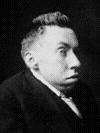
to BigEye Page #1
|
Behind the Headlines by Justin Raimondo |
|
War is a Racket, by General Smedley Butler |
A revolutionary idea whose time has come? |
 The Great Madness |
The birthplace of the creature |
 to BigEye Page #1 |
|
|
|
|
 |
John Dos Passos wrote that if ever a man had a ghost, it
was Bourne:
A tiny twisted unscared ghost in a black cloak |
|
When World War I erupted it came as a surprise to the overwhelming majority of American intellectuals. Its barbarity stuck them as anachronistic and
they tended to view the conflict as a temporary sidetrack in the march of
civilization, an expression of residual animal instincts. The dawn of the
Enlightenment and the tremendous progress made in the Nineteenth Century
made war seem quite uncharacteristic (in their view) of humanity's evolving
nature. |
|
Stewart Ogilby Sarasota, FL 1995 |
BigEye's readers might also enjoy the following --
Inconvenient TruthsHow and Why International Bankers Make War
Randolph Bourne - The Heath Anthology of American Literature
"The Great Madness" by Scott Nearing
War is the Health of the State - Chapter from Howard Zinn's A People's History of the United States
Our Enemy, the State by Albert Jay Nock
The Warfare State - A Brief Synopsis
Natural Elites, Intellectuals, and the State
Waco and the Bipartisan Police State
The Antifederalists Were Right
Fascism: Clarifying a Political Concept
Information on pursuing your online MBA

